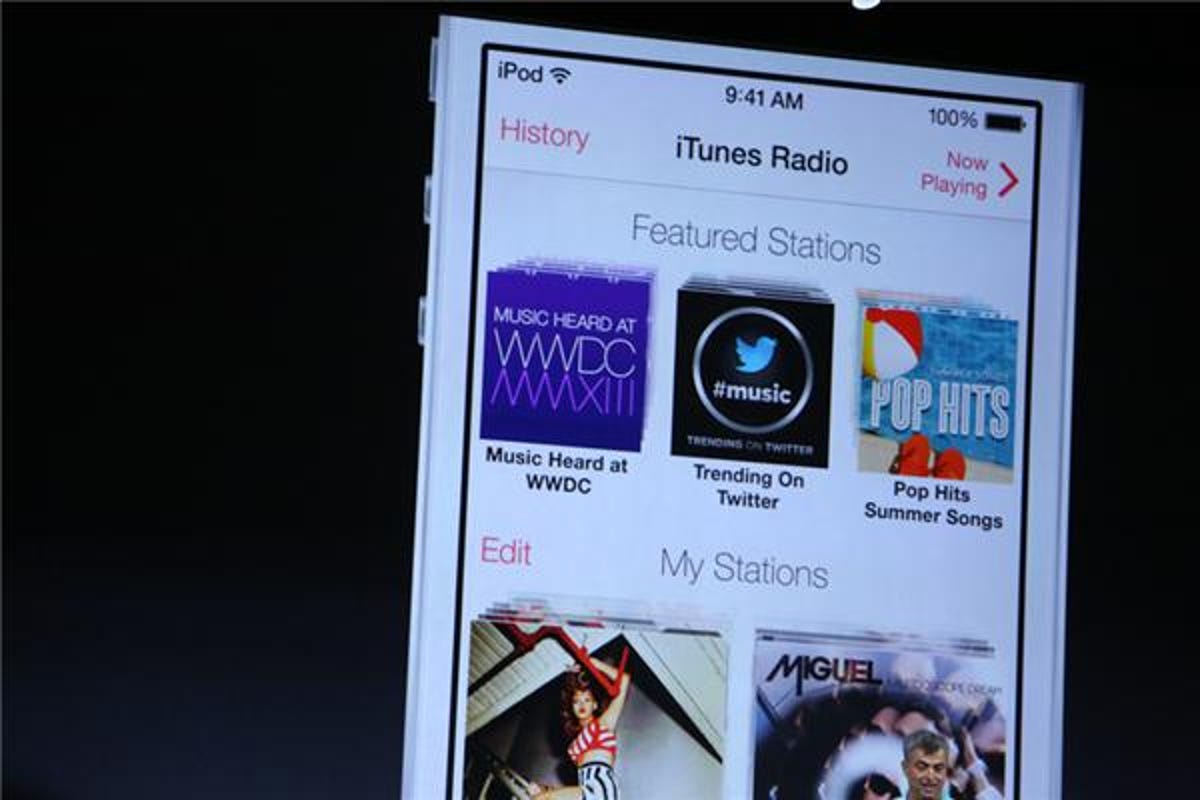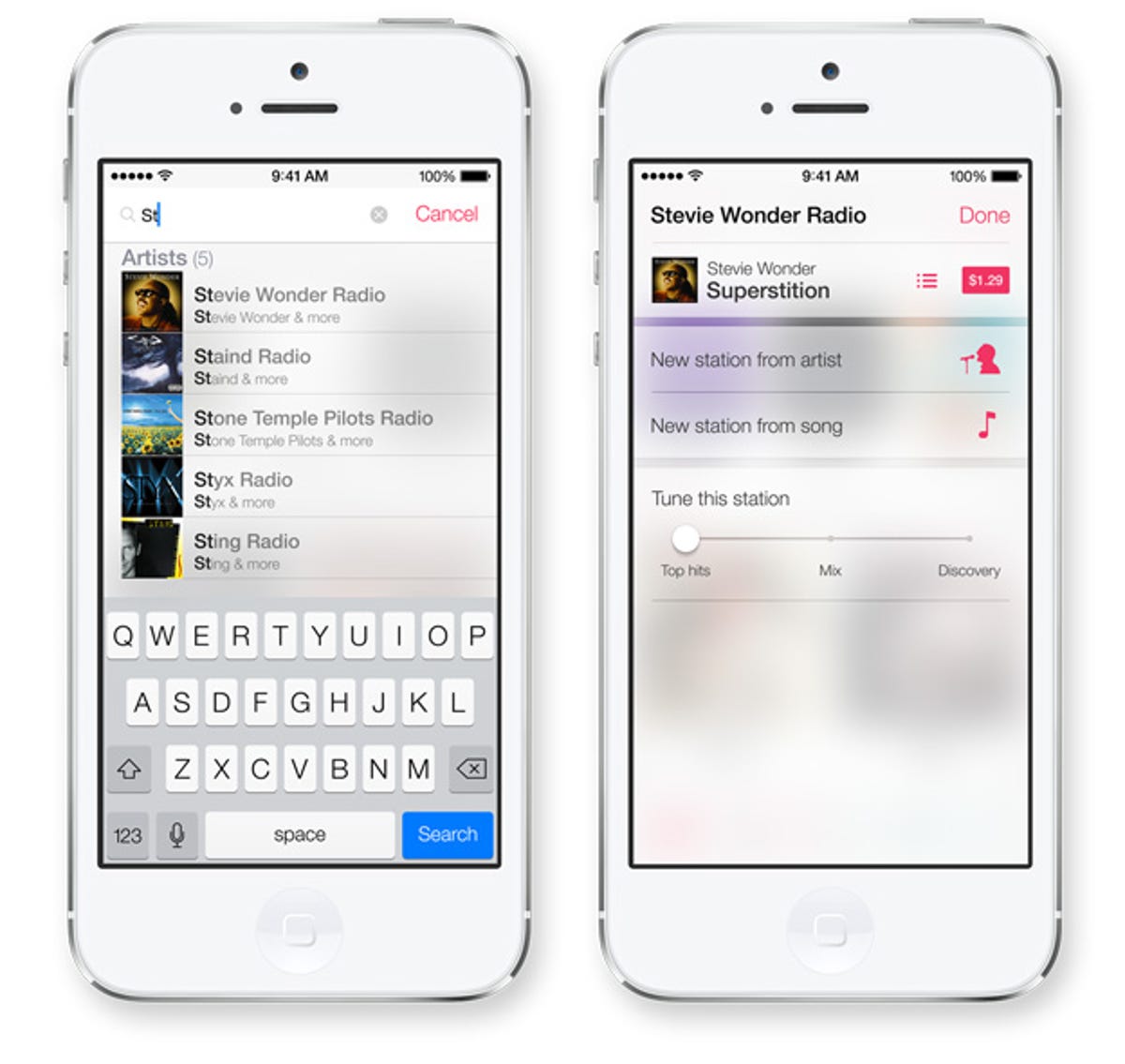
James Martin/CNET
Apple may be the top dog when it comes to digital music sales, but does it have what it takes to get a late foothold in the world of Internet radio?
To cut through the hype and get a sense of what Apple’s newly announced iTunes Radio service really offers that may be noteworthy, we’ve stacked it up against the gold standard of personalized Internet radio, Pandora.
table.geekbox th{background-color:#E6ECEF;text-align:left;font-weight:bold;}
table{width:600px;}
table.geekbox tr.even{background-color:#CCCCCC;}
.ratingGood{color:#093;} .ratingAverage{color:#666;} .ratingBad{color:#C00;}
| iTunes Radio | Pandora | |
|---|---|---|
| Free option | Yes | Yes |
| Premium tier | $24.99/year | $36/year $3.99/month |
| Platforms | iOS, Apple TV, Mac OS, Windows | iOS, Android, Windows Phone, BlackBerry, Mac OS, Windows |
| Global reach | U.S. | U.S., Australia, New Zealand |
Catalog
Without a deep and diverse catalog of music to pull from, there’s not much to distinguish Internet radio from terrestrial radio.
So who’s got the best selection of both mainstream artists and diamonds in the rough? Truth is, we don’t know yet.
We know that Apple has struck direct deals with the three major labels in the U.S.: Sony, Warner, and Universal. But while those deals will be critical to the financial success of iTunes Radio, the per-song fees Apple pays out, and the rules governing how Apple plays those songs, it does not necessarily point to a win for Apple in terms of catalog size.
As of 2013, Pandora describes its library as having more than 1 million songs from more than 100,000 artists. It does not, to our knowledge, have direct agreements with any of the major labels, but because it operates under the laws and guidelines for Internet radio, Pandora is free to play whatever music it likes, so long as it pays a standard Internet radio royalty fee for that stream.
The fresh new look of Apple iOS 7 (pictures)






Bottom line: It’s too early to tell which of the two services will have the deeper catalog. More important, perhaps, is how each service will filter the catalog it has to present users with useful results.
Suggestion quality
iTunes Radio isn’t the first service to challenge Pandora. One factor in the company’s unshakeable dominance in streaming radio for over a decade is the quality and consistency of its music discovery algorithm, or what it calls The Music Genome Project. Every song ingested into Pandora is passed by a pair of human ears and tagged for musical attributes that link similar songs across genres, eras, and artists. It’s a painstaking process, but the results are difficult to duplicate and the resulting quality of the music discovery is what has kept the service at the top of the pack for years. In addition, Pandora is sitting on a massive data set of user-feedback measured in the thumbs-up or thumbs-down rating of songs. By the company’s calculation, this feedback has created over 30 billion pieces of unique data to feed into their song selection algorithm.
Related stories
- Which music service should you use?
- iTunes Radio First Take
- Meet iTunes Radio, Apple’s long-awaited streaming-music service
But what Apple may lack in employed musicologists it makes up for in the crushing scale of its data collection. As the world’s largest retailer of digital music, Apple has all the data it needs to effectively link the buying and listening habits of iTunes users and spin that into an effective suggestion algorithm. It’s a technique it already employs with its Genius Playlists and Genius Mixes, and it works quite well.
That said, without a working version of iTunes Radio until later this year, it’s too early to tell which of the two services offers superior music discovery. My money, though, is on Pandora.
Features
Apple is bringing a number of interesting features to iTunes Radio that may prove impossible for Pandora to match. One of the more intriguing features is a level of control over how the song suggestion algorithm selects its next tune. From the looks of it, Apple provides a slider setting that can be set to play just “hits” or actively seek out songs you’ve likely never heard before.


Apple
The fact that iTunes Radio is baked directly into iOS 7 gives it some additional advantages. You can use it with Siri, literally calling up your favorite station or asking Siri to hear music similar to your favorite artist. Airtight integration with iTunes also makes it snap to purchase any currently playing song — a feature that I’m sure both Apple and labels are thrilled by.
While Pandora has never been a service with many bells and whistles, it is still the first name that springs to mind when you think of Internet radio. Its best feature, arguably, is its ubiquity. It can be found on both iOS and Android, as well as standalone premium apps for Mac and PC, and a number of connected appliances, such as TVs.
Audio quality
Apple has yet to publish specs on the streaming-audio quality of iTunes Radio, and until the service is available, we can’t even offer a subjective take on the audio quality. Pandora offers up to 192Kbps (AAC) for premium subscribers, whereas free users are capped at 128Kbps (AAC) for computers and connected appliances, and 64Kbps (AAC) for mobile.
Price
Both iTunes Radio and Pandora can be used as free, ad-supported services, as well as offering a premium, ad-free, subscription-based tier. For iTunes Radio, the subscription price is $24.99 per year for Apple’s iTunes Match service, which includes ad-free iTunes radio. Pandora customers must pay $36 per year for Pandora’s premium Pandora One service, which both removes ads and improves audio quality.
Apple’s proposition is the clear winner here. Not only is its product priced $11 less, but users are also provided cloud backup of their iTunes music collection.


Now playing:
Watch this:
Get social with Pandora
2:21
Social integration
Having recovered from its poorly conceived Ping service, Apple has seemingly refortified iTunes from the outside world. At first glance, there appears to be no way to share iTunes Radio stations among friends or tweet your currently playing iTunes Radio song. That functionality may reveal itself once we begin to play with iTunes Radio, but there is no mention of it in the preview material or images.
And while Pandora is certainly no Spotify when it comes to getting social with your song plays and playlists, it has recently modernized itself with a number of Twitter- and Facebook-friendly features, shown in the video above.
Philosophy
I know its sounds like an odd criteria, but I think the most telling distinction between these two services comes down to their motivating philosophy.
The purpose of iTunes Radio is to sell more music. Pure and simple. Apple could recoup its losses by selling an ad or two or getting listeners to convert to iTunes Match subscribers, but the bet that it’s making is that the more good music it plays for you, the more of it you’ll be inspired to buy.


Now playing:
Watch this:
Apple rethinks music with new-streaming radio service
5:00
Pandora, on the other hand, is not in the business of selling music. It sells ads and it sells subscriptions, and it passes off purchases to iTunes and Amazon. Pandora’s endgame is to replace the role of terrestrial music radio in the hearts and minds of its listeners. It has no financial motivation to play a major label artist over an independent one. Its goal is to keep you glued as a habitual listener. Personally speaking, that’s a business model that resonates a little better with me as a listener and a fan of independent music, but maybe I’m just being preemptively cynical about how Apple works with its major label partners.
Limitations
Because Pandora operates without any direct label deals, it is forced to abide by the laws governing Internet radio. This means that features such as rewind or repeat are not permitted. Also, songs from the same artist or album are not allowed to play back to back. You can’t just call up a specific song and have it play on-demand. Another limitation to Pandora is that users are limited to 12 total song skips every 24 hours.
We’ve yet to see what real limitations are part of iTunes Radio. Like Spotify, its direct label relationships should keep it from getting bogged down by the same laws that govern Pandora.
Conclusion
With iTunes Radio still months away from becoming a reality, it’s too early to tell what it will mean for Pandora and its listeners. At first blush, though, it does look like a serious competitor, a useful addition to Apple’s iTunes empire, and a new tool for music fans to discover great music.
Update: This article has been updated with more recent catalog and data figures submitted to us by Pandora.



